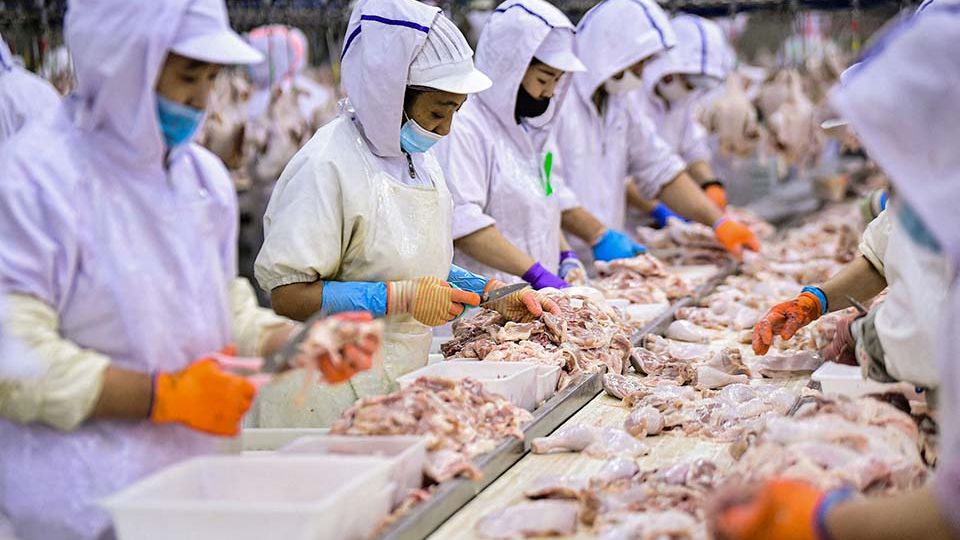April 9, 2025
SHANDONG/SINGAPORE – China looks set to up the ante as it stares down the latest tariff threat from the United States in a rapidly spiralling trade war.
On April 8, two prominent Chinese social media commentators seen as connected with the state outlined six ways in which China could hit back. Citing unnamed sources, they listed measures ranging from stopping fentanyl cooperation with the US to importing fewer American films.
This comes after US President Donald Trump threatened on April 7 to slap an additional 50 per cent tariff on Chinese imports if Beijing does not withdraw its tit-for-tat retaliatory levies of 34 per cent. This could bring the total tariff hikes imposed by the US on China in 2025 to 104 per cent, effective from April 9.
Undeterred, a Chinese commerce ministry spokesperson said on the morning of April 8 that Beijing would take countermeasures if Washington were to escalate tariffs against China. The spokesperson also declared that China will “fight till the end”.
Later that same morning, the influential WeChat accounts of Niutanqin (Cow Play Piano) and Tuzhuxi (Chairman Rabbit) offered hints of the possible shape of further retaliation from China, listing six measures that it could adopt against the US.
Analysts say the posts were likely state-sanctioned and meant to pressure the US to think twice about imposing the additional 50 per cent tariff.
According to the broadly similar posts by the two bloggers, China could suspend cooperation with the US on fentanyl, referring to the synthetic opioid whose abuse results in thousands of American deaths a year. The US, claiming that many of precursors of the drug are made in China, has been pushing Beijing to do more to stem their flow.
The posts also said China could further hike the tariff levied on US soya beans, sorghum and other agricultural products, or find other ways to restrict these imports.
Beijing could also curb purchases of US poultry on account of bird flu spreading in the US now.
Another countermeasure could be to target US services, which – unlike manufactured goods – China buys more than it sells to the US. Beijing could restrict US companies from participating in Chinese government procurement exercises, they said, and limit Chinese companies’ cooperation with US legal consulting firms.
Niutanqin is run by Mr Liu Hong, who is affiliated with the state news agency Xinhua, while Tuzhuxi is the pen name of Mr Ren Yi, the grandson of the late senior communist party official Ren Zhongyi, who served as Guangdong party chief.
The duo had posted on their separate WeChat accounts six broadly similar countermeasures within an hour of each other, citing unnamed sources. Mr Ren also posted on X.
Another possible countermeasure, said Mr Ren and Mr Liu, is to reduce or ban imports of US films.
In his post on X, Mr Ren wrote that China’s TV and film industry has seen significant growth, citing the success of Ne Zha 2, while adding that Hollywood films “have been in steady decline”.
“Recently, Snow White flopped miserably in the US partly due to a lack of innovation and excessive ideological messaging, alienating both sides of the political spectrum, and being abandoned by audiences,” he added.
Snow White, a live-action remake of the Disney animated classic, has disappointed at the box office in the US after being dogged by various controversies, including the casting of Rachel Zegler, an American actress who is partly of Colombian descent, as the lead character Snow White.
In his post on X, Mr Ren also suggested that Beijing could investigate the “intellectual property profits of US companies in China”, without going into specifics.
Interviewed by The Straits Times, Dr Chen Bo, a senior research fellow at the East Asian Institute in NUS, said: “It seems that these posts are meant to be put out there to float these ideas for the state.”
If these six buckets of additional measures were to be implemented, their effect is likely to be “mild”, he said.
He also pointed out that as China’s trade deficit in services with the US is roughly only a tenth the size of its goods trade surplus, and the absolute volume of the service trade is much smaller than the goods trade, any effort to buy fewer services from the Americans is not going to move the dial for the White House.
- Joyce ZK Lim is The Straits Times’ China correspondent based in Shenzhen.
- Yew Lun Tian is a senior foreign correspondent who covers China for The Straits Times.

